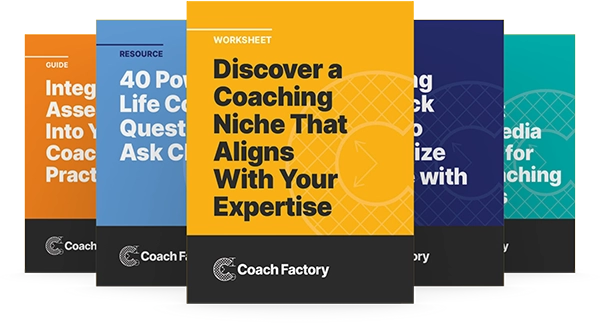Coaching is your passion. You love connecting with people and helping them become the best version of themselves. It would be a dream to have your coaching programs overflowing with eager clients or have your book become a New York Times Best Seller. But, this can’t happen without people knowing about you.
Putting yourself out there can feel uncomfortable, and this is why some coaches shy away from it. But it’s absoutely necessary if you want to see growth in your coaching practice.
In a recent conversation, experts Jennifer Bourn and Milana Leshinsky weighed in on how to transform a ‘salesy’ content approach into a relatable content strategy that potential clients will connect with and appreciate.
The Purpose of Content Creation
According to Coach Factory content expert, Jennifer Bourn, there are three main reasons why you would need to create content.
“When it comes to creating content, especially if you’re a coach, there’s the content that you need to run your business, there’s the content that you create for courses or programs to support your coaching, and then there’s content for marketing to help get people to your website and help people find you and discover you and figure out that you’re who they’ve been looking for.”
— Jennifer Bourn
Content is what attracts future clients to you. Whatever you put out is what you will attract to your coaching practice. To ensure that your content is effective, it is important to choose a specific and narrow topic. By focusing on a specific area, you can provide information that zero in on the issues your future clients are facing. The goal is for your potential clients to consume your content and feel empowered to take the next step in allowing you to help them make a positive change in their lives.
Coaching Genie’s Milana Leshinsky adds to the conversation by emphasizing the importance of creating content that goes beyond just teaching or sharing information. She believes that great content should lead to a mind shift, where the audience experiences ‘aha’ moments. This is achieved by creating content that brings about a paradigm shift in the way people think.
As a coach, you wear another hat as a content creator. This means you have to think more about what you want your audience to do, learn, feel, or believe as a result of consuming your content.
The Importance of Storytelling
Before anyone signs up for a coaching program and hops on a call with you, they have to feel compelled to do so. Effective storytelling sparks an emotional connection from your audience which allows you to make a greater impact. When you embed storytelling into your content, it makes it more relatable and memorable.
Storytelling shifts the focus from strictly “selling” to amplifying the lives of your potential clients and making them feel seen. According to Milana, storytelling is a powerful tool for coaches because it allows you to share your personal experiences and lessons learned. By sharing your own stories or the stories of your clients, you can inspire and motivate your audience, and they can see themselves in your journey.
“You want to work with coaches who feel like your person. They get me, they understand me, they sympathize with my experience, and we have something in common.”
— Milana Leshinsky
Creating Content That Best Represents Your Brand
Before you start recording content, you need to understand that you don’t have to start from scratch. You do need to be clear on your brand messaging. Ask yourself the following questions to get started:
- What problems are you solving?
- What obstacles are you overcoming, right?
- What mindsets are you shifting?
- What outcomes are you looking to provide?
This serves as a roadmap and a firm foundation for building brand authority and trust with your audience. From here, you can explore different content themes.
Let’s explore a few.
1. Offer-based content
Offer-based content focuses on providing more information surrounding the tangible resources and services you offer. These resources include blog posts, articles, videos, podcasts, programs, or products that provide your audience with the transformation they’re seeking. The goal is to showcase your expertise while subtly pointing potential clients in your direction and provide tangible value to your audience.
“I start with a video conversation, usually on my own, usually I don’t have such a brilliant partner like I do right now, but I record it and I send it to my team and they edit it, they transcribe it, they turn it into a newsletter article, a blog post, social media post.”
— Milana Leshinsky
This method allows her to leverage her knowledge and create content in different formats that cater to different preferences. It also saves her time and ensures that her expertise is effectively communicated to her audience.
2. Opinion-based content
Opinion-based content involves sharing your perspective and insights, on topics related to your coaching niche. For example, you may have strong opinions against group coaching programs. Use this stance to create content surrounding why this is an issue for you and speak on the alternative options you offer. This type of opinionated content allows you to differentiate yourself from others in your industry and establish your thought leadership.
“It doesn’t matter if anybody has ever said any of the things that you want to say. The people that are right for you and the people that need you and the people that know you, want to hear from you. They need to hear your voice and your opinion.”
— Jennifer Bourn
Sharing your unique ideas and perspectives helps you connect and attract an audience that shares your values and expertise. It also presents a new opportunity to inspire someone to change their perspective by exposing them to a new way of thinking.
Personalization Is the Key to Effective Coaching Programs
When it comes to creating content for coaching programs, Jennifer stresses the importance of considering the style and objective of the program. Business coaching programs with coaching may include workbooks, videos, worksheets, and resources. Programs emphasizing accountability and productivity may offer less content and focus more on coaching individuals through specific challenges.
Jennifer suggests that when developing content for coaching programs, it’s important to identify what needs to be repeated for each person and what needs to be consistent for everyone. This includes providing necessary information and experiences at the beginning of the program to ensure everyone is on the same page. Considering each person’s needs, learning, and feelings at different program stages can create a consistent experience for all.
Coaching Genie, as highlighted by Milana, is a valuable tool for organizing and delivering content in coaching programs. It allows coaches to load all their content and have it drip out or show up at the right time to meet the needs of each individual. This customization feature is particularly useful for group programs, because coaches can tailor the content to each client’s unique journey and level of experience.
Leshinsky and Bourn both agree that personalizing the content for each client, even in a group program, makes individuals feel seen and recognized. It creates a special experience for clients who may be at different stages in their coaching journey. This personalization can be a powerful way to honor each client’s unique needs and create a more impactful coaching experience
Content Is Still King
Bottom line — content is necessary for the growth and longevity of your coaching practice. Yes, there are things that other coaches have covered but what makes content creation so great is you can cover it in your own unique way. Your audience is looking for your voice, expertise, and spin on issues that they are facing everyday. It’s up to you to show up and give them exactly what they’re looking for.
It’s also important to note that content doesn’t have to be strictly about making sales. If you create quality content that your potential clients crave and can deeply relate to, the sales will ultimately make themselves.


